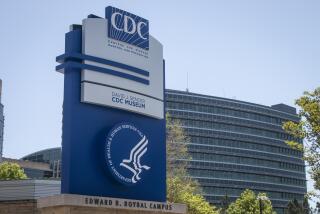Deukmejian Fears Trauma Fund Misuse, Official Says
- Share via
In comments labeled as “preposterous” by one lawmaker, a high-ranking state official said Thursday that Gov. George Deukmejian’s opposes bailing out Los Angeles County’s faltering trauma care network in part because hospitals might improperly use the money to recover other losses.
Health and Welfare Agency Deputy Secretary John A. Ramey, explaining a recent veto of legislation that would have pumped $26 million in state and federal money into trauma centers statewide, told an Assembly subcommittee in Los Angeles that the bill was “fatally flawed.”
“The $26 million in our view creates a situation in which the wrong economic incentives apply and in which the needs of the system as a whole are not addressed,” Ramey said. “There is a great possibility for procedures that have not been previously identified as being strictly ‘trauma’ to become trauma because there is a funding source for that that there isn’t for other things.”
Governor’s Own Explanation
Ramey’s comments--coming two days after Queen of the Valley Hospital in West Covina announced its defection from the local network--differed from the governor’s own explanation of why he vetoed the trauma care bill. The governor has said on several occasions that he thinks trauma care funding is a local responsibility. Deukmejian said Los Angeles County could obtain the money from local block grants he had approved in other legislation. Local officials have said the state funding Deukmejian referred to is inadequate.
While reflecting the governor’s explanation, Ramey’s testimony seemed also to indicate a fundamental mistrust of how state money is used to provide health care.
“What we have,” Ramey told the panel, “is a lot of proof that if you create the wrong incentives in a (health care) system such as ours which is very large and complex, it leads to a lot of dislocation in the system and spending for things that we don’t want or need to spend for, where we would rather be spending for other more needed services.”
Ramey’s testimony drew a sharp retort from Assemblyman Burt Margolin (D-Los Angeles), who had sponsored the vetoed legislation and chaired Thursday’s hearing of the Assembly Special Committee on Medi-Cal Oversight.
“We’re not talking about injecting so much money (into) the trauma center system that it becomes this lucrative new enterprise that every hospital wants to become (a center),” Margolin told Ramey. “We’re talking about taking a system that’s losing money by the bucketfuls . . . and negotiating with that system to not meet necessarily all of their costs--they may still have significant loss--but to try and meet them halfway.”
Later, Margolin told The Times that Ramey’s comments were “preposterous.”
Jeffrey Kirschner, chairman of the Hospital Council of Southern California, told the committee that “(Ramey’s comments) were so chock full of holes as to be laughable.”
Lowell Smith, president of Presbyterian Intercommunity Hospital in Whittier, also disputed Ramey’s testimony, saying, “I don’t feel any hospitals are in it (the trauma network) for money.”
In other testimony, the panel was told by representatives of three former trauma network hospitals--Hollywood Presbyterian; California Medical Center Los Angeles and Daniel Freeman Memorial--that only an infusion of state funds could persuade them to return to the system.
The officials also disputed a Deukmejian veto message contention that bailout money would remove the hospitals’ incentive to try and collect for unreimbursed trauma care.
Calling the governor’s logic a “red herring,” Daniel Freeman administrator James Barber said, “All the collection actions in the world won’t produce a dime from most of these patients.” Daniel Freeman dropped out of the network in June, citing more than $2 million in losses due largely to the treatment of hundreds of uninsured trauma patients.
Virginia Price Hastings, the county’s trauma network coordinator, testified that the closures by Queen of the Valley and Daniel Freeman have left major gaps in the system, “that can’t be patched” without new money. Asked what it will mean if the once highly touted network, which will now have 17 instead of 23 hospitals, collapses, Hastings said, “To revert back to something that is substandard is unethical and immoral.”
Fred Hurtado, president of the United Paramedics of Los Angeles, said the closures are having a direct impact on patient care and may be jeopardizing the safety of the paramedics themselves. Hurtado said that because the transportation of critically injured patients at high speeds is hazardous, the longer distances traveled between trauma centers increases the danger.
More to Read
Get the L.A. Times Politics newsletter
Deeply reported insights into legislation, politics and policy from Sacramento, Washington and beyond. In your inbox twice per week.
You may occasionally receive promotional content from the Los Angeles Times.










